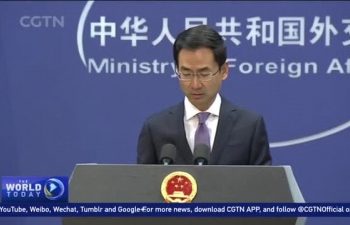CHICAGO, May 11 (Xinhua) -- Agricultural producers in the United States need all viable markets to sell their products and to stay afloat, Randy Kron, president of Indiana Farm Bureau, claimed.
In an article titled "Tariff implications shouldn't be trivialized" published on Indianapolis Business Journal on Friday, Kron deliberated on the trade disputes between China and the United States.
In the first tier when the United States proposed tariffs on nearly 50 billion dollars' worth of Chinese products in the technology sector, China retaliated with tariffs aimed at top-value American exports: agriculture products, imposing an initial 25-percent tariff on U.S. pork, wine, fruits and nuts. "The tariff on pork certainly hit close to home, as Indiana has many pork producers," Kron wrote.
The United States exports about one billion dollars' worth of pork to China annually.
What's concerned Kron more is the "looming second-tier tariffs China has proposed", as they target more agricultural products including beef, ethanol and soybeans.
Kron feared that if the United States and China can't come to terms over their dispute at the conclusion of a public hearing on May 15, the U.S. proposed tariffs would be enacted and China's would likely follow.
"That outcome would not be ideal for Indiana's farmers and consumers. Food prices would rise and some farms would be in jeopardy of failing," Kron said.
Farmers in Indiana have benefited from the expansion of trade markets and have relied on those markets to maintain or grow their farms in recent years, Kron wrote. According to U.S. Department of Agriculture (USDA) statistics, Indiana agriculture export value was 2.3 billion U.S. dollars in 2006, and then doubled to 4.6 billion dollars in 2016.
"Soybeans are the elephant in the room." Of the 21.4 billion dollars' worth of agricultural goods the United States exports to China, 14 billion dollars or about 66 percent of the goods are soybeans. Indiana exported 1.7 billion dollars in soybeans around the world in 2016, and a majority of those beans went to China.
Kron even went to a broader view, saying agricultural industry is a pillar of the U.S. economy. "When U.S. trade with China is examined, it is easy to see that volatility in that market will impact the U.S. economy."
U.S. agricultural economy is already in a downturn with farm income now 50 percent lower than it was just four years ago, said Kron. "American farmers are dealing with a global surplus of commodities, which makes the risk of facing tariffs from such a large export market a real concern."
"If a large portion of the Chinese market is lost due to sanctions, it will take a considerable amount of time to replicate or replace," Kron stressed.













